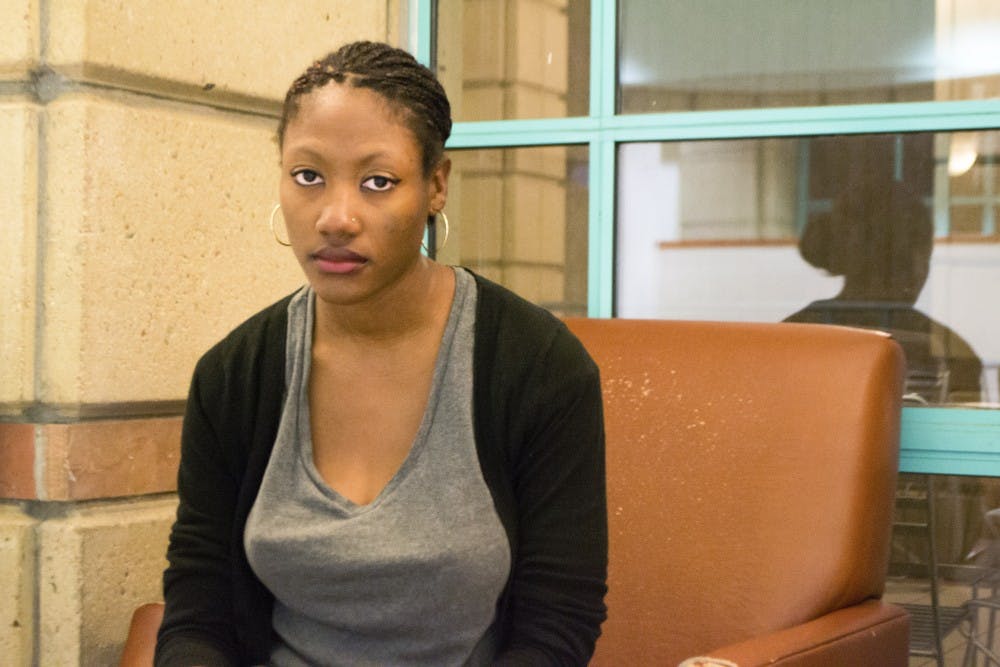 Moses Fidal on Jan. 14, 2015. Fidal is an ASU alumnus involved in the protests of police-related deaths. (Morgan Hipps/The State Press)
Moses Fidal on Jan. 14, 2015. Fidal is an ASU alumnus involved in the protests of police-related deaths. (Morgan Hipps/The State Press)Following the deaths of Mike Brown and Eric Garner, Valley protesters took to the streets of Phoenix to stand against police brutality. However, protests have cooled.
Local Facebook pages such as All Lives Matter have organized protests against the national issue in recent weeks, yet the events consistently gather fewer participants due to internal conflict, said Moses Fidal, an ASU psychology alumnus and local protestor.
"People were just paranoid of other people, and there was just a lot of in-group fighting about tactics and ideas," Fidal said. "And, of course, there was the classic division of violence and non-violence."
Fidal also faced issues with gaining interest from potential supporters.
“There’s kind of a bystander effect,” he said. “People will think ‘there’s 300 people attending the protest. I don’t need to be there,' but if there are 300 people, and 250 believe that, there will only be 50 people out there.”
Despite the dwindling attendance at local protests, Trejon Dunkley, film and media junior and activist, said she thinks the issue still deserves recognition.
“Even though the Eric Garner and Mike Brown (cases) happened so far away, it doesn’t mean it’s not in our community,” she said. “It’s a national issue in that it happens everywhere locally.”
Dunkley said the consequences of police brutality are more than an out-of-state issue.
“I’m African-American, so it’s definitely something that hits close to home for me,” she said. “I have an older brother. I have a few nephews. It does scare me thinking that they could grow up in a place where they can get killed just for being black and intimidating on the street.”
Because police brutality can affect citizens of all ages, Dunkley said she believes college students are vital to the community's voice.
 Junior film student Trejon Dunkley on Jan. 14, 2015. Dunkley is one of the ASU students involved in the protests of police-related deaths. (Morgan Hipps/The State Press)
Junior film student Trejon Dunkley on Jan. 14, 2015. Dunkley is one of the ASU students involved in the protests of police-related deaths. (Morgan Hipps/The State Press)“I have far less at stake if I decide to go out and protest than somebody at 40 or 50 who has mortgages and things to take care of,” she said. “I think that, since we have that freedom, we have an obligation to talk about it a little bit more.”
As fewer participants remain involved in local protests, however, Dunkley said she finds the strain to keep up with other activists has caused the movement to burn out.
“There’s definitely a lot of a competition,” she said. “I think I feel it especially from non-black protesters who do kind of have that sense of guilt. … But activism isn’t a competition. It’s about unity. It’s about the human family, as hokey as that sounds.”
Activists like music theater alumnus Tim Briggs said in an email he wishes to remind others police brutality remains a race-sensitive issue.
“I hear people talk about how it’s a post-racial society, which it so clearly isn’t,” Briggs said. “I hear people say ‘I don’t see skin color,’ and that’s just ridiculous. Yes, you do. … Erasing someone’s validity by saying, 'I don’t see race; I just see people,' is refusing to actually do anything about racism itself.”
While non-minority participants cannot speak for minorities, they can still help the cause, Briggs said.
“While white people do not, should not and cannot speak for black people, we can still speak out about the injustices being done,” he said.
Despite the topic’s steady decline, Briggs encourages students to search for justice.
“I hope to achieve awareness,” he said. “I also hope that people will see what is going on, realize it is not going away and it is not ‘just a one-time thing’ and feel compelled to do something. Write politicians. Stand up against the police force that is endangering lives.”
Reach the reporter at aplante@asu.edu or follow @aimeenplante on Twitter
Like The State Press on Facebook and follow @statepress on Twitter.




